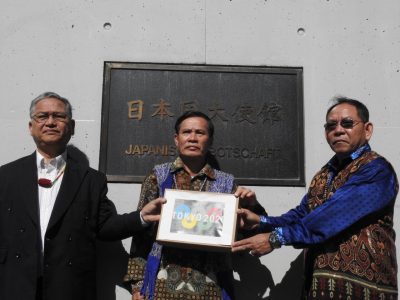NGOs Demand Olympic Authorities End Rainforest Destruction and Human Rights Abuses Connected to Tokyo 2020 Olympics Construction

TOKYO/LIMA – Today, 47 civil society organizations delivered an open letter to the International Olympic Committee (IOC) and Tokyo 2020 Olympic authorities, at the start of the IOC Executive Board Meeting in Lima, Peru. The letter reiterated grave and mounting concerns about the legitimacy and accountability of IOC sustainability commitments and the reputation and credibility of the iconic Olympic games. The letter criticizes the Olympics for knowingly exploiting tropical forests and potentially fueling human rights abuses in the construction and implementation of the games. The groups are calling for full transparency and an end to the use of rainforest wood to construct the Tokyo Olympic facilities, including the new National Olympic Stadium.
The signatory organizations, which include a broad cross section of NGOs with expertise in supply chain risks associated with environmental and human rights, are critical of the continued lack of transparency by Tokyo Olympic authorities.
“The Tokyo Olympic authorities are hiding the fact that they are using massive volumes of tropical wood to construct the new National Olympic Stadium. Without full transparency of the timber supply chain, claims to hosting a sustainable Olympics are completely baseless,” said Hana Heineken with Rainforest Action Network.
NGOs claim that the IOC’s failure to address the obvious risk of unsustainability is a clear breach of its own commitment to “include sustainability in all aspects of the Olympic Games.” In particular, they point to a major loophole in the Tokyo 2020 procurement policy that allows wood used for concrete formwork to be exempted from the policy’s environmental, labor and human rights requirements, despite the majority of this type of wood in Japan coming from the rainforests of Malaysia and Indonesia where problems of illegal logging, rainforest destruction, and land rights violations persist.
On December 6 2016, 44 NGOs sent a letter to the IOC warning them of the high risk that illegal and unsustainable rainforest wood would be used to construct Tokyo’s new Olympic National Stadium and other related facilities. The groups warned that failure to adopt additional safeguards and due diligence measures at the outset of the construction could result in complicity with human rights abuses, illegal logging, and rainforest destruction. The letter offered evidence of high risk timber from Malaysia being used in Tokyo construction projects and argued that the Tokyo 2020 Timber Sourcing Code is ill-equipped to prevent the use of risky timber. Yet, not a single demand put forward in the letter has been met.
Today’s letter states that the new National Olympic Stadium is using significant volumes of rainforest wood as concrete formwork plywood. They point to evidence that tropical plywood supplied by a notorious Malaysian timber company called Shin Yang is being used, despite the company’s history of illegal logging, rainforest destruction, and human rights violations. While Tokyo Olympic authorities have defended their use of Shin Yang wood by claiming it is certified, the letter refutes claims to sustainability with evidence that Shin Yang’s certified wood is linked to human rights violations in Sarawak, Malaysia. The letter also states that the majority of wood being used for the Stadium as concrete formwork is in fact uncertified and very likely to have originated from the rainforests of Malaysia or Indonesia, which supplies most concrete formwork plywood used in Japan.
“Shin Yang’s certification is meaningless in the face of evidence from Indigenous representatives themselves that its logging practices are destroying Indigenous peoples’ traditional lands and livelihoods,” said Peg Putt, CEO of Markets For Change.
Tokyo 2020 authorities are in the midst of developing procurement standards for palm oil and pulp & paper, commodities that are major drivers of tropical deforestation. Given Japan’s significant consumption of rainforest-derived paper and growing consumption of palm oil, NGOs warn Olympic authorities to adopt robust social and environmental safeguards or face further criticism for fueling rainforest destruction, illegal logging and human rights violations.
Featured image is from the author.

